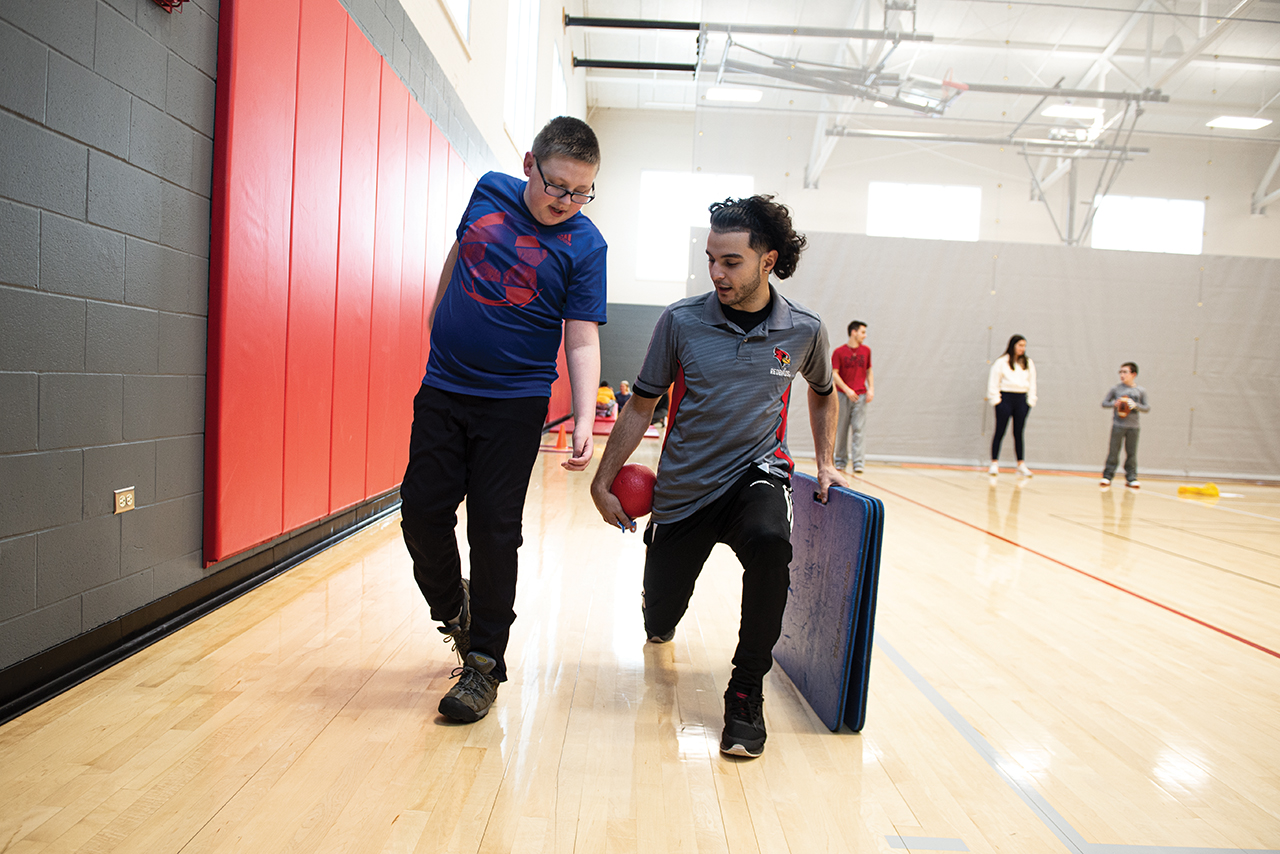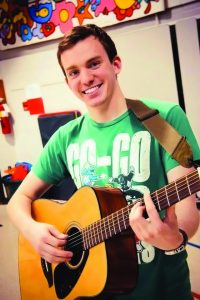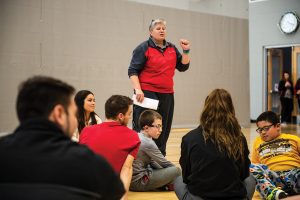Gym class was the worst part of Jon Miskulin’s day in junior high. Changing clothes in the locker room was torture, so he would change into his PE uniform in the nurse’s office. When he would get home, he would tell his mom he felt beat up, although she knew he didn’t mean physically. But to a child on the autism spectrum, unkind words cause physical pain.
Jon graduated from a Bloomington-Normal elementary school without ever being invited to a birthday party. By junior high, he would walk in the door after school, get in the shower, and cry. The length of his shower told his mom how bad his day was.
Jon had Asperger’s syndrome, and died at the age of 20 from a traumatic brain injury. But during his short life, he created the H.E.A.L. Foundation (Heroes Embracing Autistic Lives), and used his musical and motivational-speaking talents to encourage awareness and acceptance of those on the autism spectrum.
Jon’s mother, Geralyn Miskulin, shared the story of how difficult PE (physical education) was with Mary Henninger, an Illinois State associate professor who educates future PE teachers.
“That really struck a chord with me as a PE teacher,” Henninger said. “I thought, that can’t keep happening. How can I change that?”
Henninger didn’t want another child to ever be afraid of PE. And that’s when she came up with the idea of an on-campus program for children with autism, pairing them with her physical education teacher education (PETE) majors. She worked with Nikki Michalak, assistant instructional professor and research coordinator of the Autism Training and Technical Assistance Project in the Department of Special Education. Michalak had previously reached out to area gyms to see if a class could be offered for children with autism, but found the cost to be prohibitive.
Then Jon’s Heroes in Training began last fall. Named for Jon Miskulin, the after-school program is part of the adapted physical education course required for PETE students and offered through the School of Kinesiology and Recreation (KNR).
Jon believed everyone was a hero. When he met someone at a speaking engagement, he would ask them what their superpower was. In Jon’s Heroes, the children with autism are the heroes, and the PETE majors are heroes-in-training. Anyone between the ages of 3 and 21 with a primary diagnosis of autism is eligible for the free program.
Jon’s Heroes started with nine students, and grew to 24 in the spring. The program meets in the McCormick Hall gym, where the heroes get one-on-one coaching, and a chance to socialize with their peers.
The goal is for the children to have a safe, fun, educational experience, while also learning lifelong fitness skills. Once children with autism age out of the school system, they are more likely to become inactive and overweight, Geralyn Miskulin said. Exercise also increases their ability to regulate themselves, which can impact behavior.
The PETE students gain empathy and practical experience that prepares them to work with the children they’ll have in their classrooms. Henninger begins by debunking the myth that children with autism do not communicate with the world around them.
“I talk about the language of connection,” she said. “We have to make it into their world. A lot of times people have this myth that kiddos with autism don’t attend to the everyday world around them. They do, they just do it in a different way. If we can connect with them in their area of interest, we’re going to make that connection happen.”
She teaches her students to look for the child’s special area of interest. For 13-year-old Tyler Auten, it’s Pokémon. Although his hero-in-training, senior Anthony Toro, knew nothing about the video game, he quickly educated himself and started using Pokémon to teach Tyler how to “evolve” through skills like pushups.
Tyler’s mom, Dawn Auten, said her son was in adaptive PE through elementary school but wanted to be with his peers in junior high. He is so excited about the Heroes program, he literally counts down the days to the next session.
“He loves coming here,” she said. “A lot of kids with autism don’t want to leave their house.”
The class is a big hit for Toro too.
“This clinical is by far my favorite,” he said. “I’ve seen a lot of growth in myself because of this, and it’s pretty much because of Tyler.”
Establishing a relationship is just as important as teaching the skill, Henninger said. “Once you break into their world, whether it’s relating to their love of Legos or hockey or running, that establishes trust. And once we have trust, we can take those kids anywhere. We assume that relationship is going to develop the same way it would with any other kiddos and it just doesn’t happen that way and that’s OK. That’s the whole message. We don’t have to fix them. We have to accept and understand them.”
Annie McGee teaches physical education at Hudson Elementary School and began teaching KNR classes as an associate professor this fall. Last spring, she observed Jon’s Heroes.
“It’s such a confidence builder for both the student and teacher,” she said. “This is real life. It’s amazing for them to be able to work one-on-one. These are things you can’t learn in the classroom.”
Lesson plans are different from a typical PE class. They are broken down into more steps, and may include a behavioral plan. Michalak’s special education students volunteer to help with the plans. One of the things that’s reinforced is that all behavior is communication, she said.
“Often our kids don’t have the verbal ability to tell us what’s wrong, and what’s easier, using your words or your behavior? This gives the PE teachers some experience in understanding how some of the behaviors are communication and how they can look at behavior a little bit differently to problem-solve.”
Having the disciplines work together is good practice for when the students get into their schools, Henninger added. “I want that culture of collaboration to start here so when they get their jobs, they remember, ‘Oh yeah, the PE teacher was a really good resource for my kiddo with a disability’ and, ‘Oh yeah, the special ed teacher was a good resource.’”
Geralyn Miskulin can see the difference a PE teacher with an increased awareness makes.
“I believe every single one of these teachers truly will change the dynamic in their school. They have the power to enter the building and tell the math teacher or science teacher, ‘I am trained to help you. I know how to reach these children,’ and that can change their world.”
The children also respond well to peer teaching, so having them model for each other is the ultimate goal, Michalak said.
“We want them to blend in. We want them to use those natural supports that are there. When we can structure it so that happens here, hopefully that will carry over to the school and community settings.”
Parents also benefit from the program, not only by hearing about where their children are succeeding, instead of failing, but by networking with other parents. Henninger is working on a plan to allow them to use the Student Fitness Center while waiting for their children.
“It’s a unique situation to have a child on the spectrum,” Henninger said. “It can be very isolating and stressful.”
The professor said she can’t wait to start doing research on what makes the program work so she can make it available as a summer program for teachers. Jon’s Heroes combines teaching, research, and service into one package, she said.
Funds from the H.E.A.L. Foundation and the University’s Senior Professionals help support the program, providing free parking for parents, certificates, and T-shirts.
Geralyn Miskulin said the program is giving the PETE majors something that’s been missing.
“They are graduating with an experience far greater than the credit hours. They may sit in a classroom and take classes on how to be a good PE teacher but none of those classes are going to prepare them to have a child with autism in their classroom. All you need to do is respect them.
“It’s not if you’re going to have children on the spectrum in your classroom. You’re going to have five or six, and you’re going to have to meet those needs.
[Ed. note: Mary Henninger was named a 2019 Above and Beyond Autism Champion for Autism McLean. This award recognizes members of the local community who have made a direct impact on families and individual with autism. These champions, lead by example, make a positive difference, and help make McLean County an Autism Friendly Community. Congratulations, Mary!]
To sign up a child for Jon’s Heroes in Training or for more information about the program, contact Associate Professor Mary Henninger at (309) 438-3552 or mlhenni@IllinoisState.edu.




